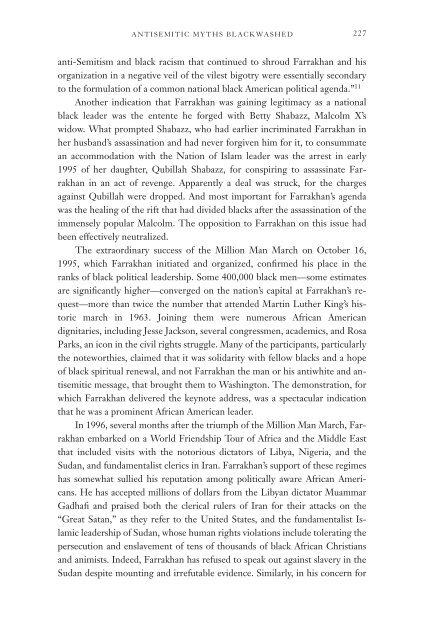41845358-Antisemitism
41845358-Antisemitism
41845358-Antisemitism
Create successful ePaper yourself
Turn your PDF publications into a flip-book with our unique Google optimized e-Paper software.
ANTISEMITIC MYTHS BLACKWASHED<br />
227<br />
anti-Semitism and black racism that continued to shroud Farrakhan and his<br />
organization in a negative veil of the vilest bigotry were essentially secondary<br />
to the formulation of a common national black American political agenda.” 11<br />
Another indication that Farrakhan was gaining legitimacy as a national<br />
black leader was the entente he forged with Betty Shabazz, Malcolm X’s<br />
widow. What prompted Shabazz, who had earlier incriminated Farrakhan in<br />
her husband’s assassination and had never forgiven him for it, to consummate<br />
an accommodation with the Nation of Islam leader was the arrest in early<br />
1995 of her daughter, Qubillah Shabazz, for conspiring to assassinate Farrakhan<br />
in an act of revenge. Apparently a deal was struck, for the charges<br />
against Qubillah were dropped. And most important for Farrakhan’s agenda<br />
was the healing of the rift that had divided blacks after the assassination of the<br />
immensely popular Malcolm. The opposition to Farrakhan on this issue had<br />
been effectively neutralized.<br />
The extraordinary success of the Million Man March on October 16,<br />
1995, which Farrakhan initiated and organized, confirmed his place in the<br />
ranks of black political leadership. Some 400,000 black men—some estimates<br />
are significantly higher—converged on the nation’s capital at Farrakhan’s request—more<br />
than twice the number that attended Martin Luther King’s historic<br />
march in 1963. Joining them were numerous African American<br />
dignitaries, including Jesse Jackson, several congressmen, academics, and Rosa<br />
Parks, an icon in the civil rights struggle. Many of the participants, particularly<br />
the noteworthies, claimed that it was solidarity with fellow blacks and a hope<br />
of black spiritual renewal, and not Farrakhan the man or his antiwhite and antisemitic<br />
message, that brought them to Washington. The demonstration, for<br />
which Farrakhan delivered the keynote address, was a spectacular indication<br />
that he was a prominent African American leader.<br />
In 1996, several months after the triumph of the Million Man March, Farrakhan<br />
embarked on a World Friendship Tour of Africa and the Middle East<br />
that included visits with the notorious dictators of Libya, Nigeria, and the<br />
Sudan, and fundamentalist clerics in Iran. Farrakhan’s support of these regimes<br />
has somewhat sullied his reputation among politically aware African Americans.<br />
He has accepted millions of dollars from the Libyan dictator Muammar<br />
Gadhafi and praised both the clerical rulers of Iran for their attacks on the<br />
“Great Satan,” as they refer to the United States, and the fundamentalist Islamic<br />
leadership of Sudan, whose human rights violations include tolerating the<br />
persecution and enslavement of tens of thousands of black African Christians<br />
and animists. Indeed, Farrakhan has refused to speak out against slavery in the<br />
Sudan despite mounting and irrefutable evidence. Similarly, in his concern for


